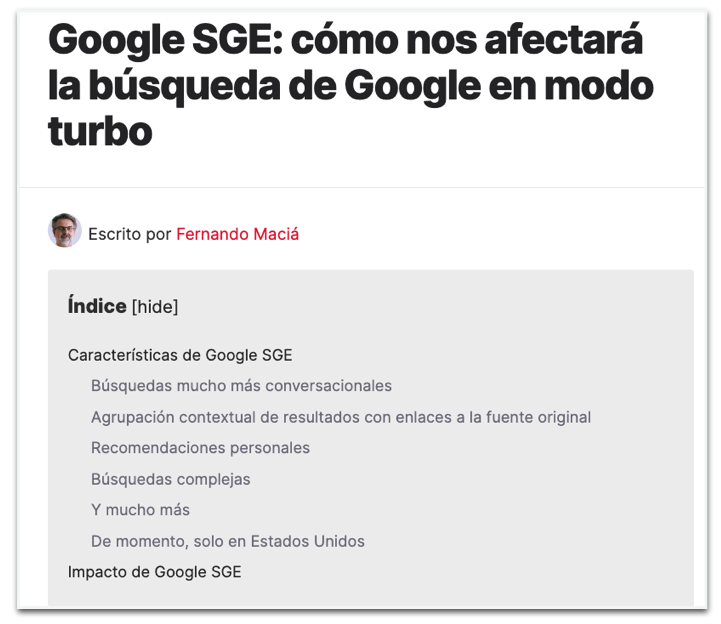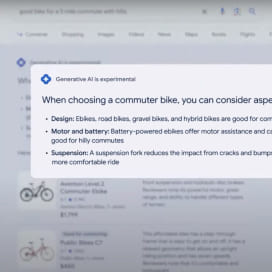Written by Juan Antonio Castillejos
Índice
The EEAT is a set of evaluation points that Google takes into account to assess the quality and reliability of website content.
These points are evaluated by Google’s algorithm, but the guide for evaluators of the quality of results gives us some clues as to the factors on the basis of which Google evaluates the quality of a piece of content. For particularly sensitive content, this assessment can have a direct impact on the positioning of the content on the results page (SERPs). Google’s ultimate goal is to make the information useful and reliable for the user.
Although all these factors are important, a text does not have to meet all of them and the objective should be to combine several of them. According to Google’s own documentation, “some of the content may be useful because of the experience it shares,” and some of the content may be “useful to the user because of the knowledge it contains.”
Previously, in 2014, Google already spoke of the acronym EAT to refer to the concepts Expertise, Authoritativeness and Trustworthiness, which became particularly important when evaluating topics known as YMYL (Your Money, Your Life), which deal with areas such as money or health.
“Some issues could significantly affect the health, financial stability, safety of individuals, or well-being of society. We call such issues Your Money Your Life, or YMYL.”
In 2022 Google updates the factors that become important when evaluating website content and adds “Experience”, thus completing the acronym EEAT.
What is the EEAT Experience for Google?
Experience, as part of the EEAT, is interpreted by Google as the fact that the author of a piece of information has directly interacted, in first person, with what he/she is writing about. As we shall see, this direct experience must also be demonstrable.
Regardless of whether the author is an expert (Expertise) or not in the subject matter, the fact of interacting or relating directly with the subject, topic, specialty or object being discussed is now a weighty factor for Google to consider the content reliable and of quality.
Therefore, the search engine will give more visibility, through a better ranking in the results, to those contents that come from a reliable source and that demonstrate that it has directly experimented with the object of the information.
Examples of Experience in content creation
Depending on the subject or topic analyzed in the text, the way to generate this direct experience will be different. Here are some examples:
- To review a cell phone, the author must have had the handset in his hands and must have investigated for himself those aspects he is going to talk about in his review.
- If the author intends to review a restaurant, he/she should visit it and experience on the premises everything he/she is going to review (premises, food, service…).
- For a recipe website, the information the author generates will be more reliable for Google if the recipe has been cooked directly.
In addition, the direct experience should be reflected in the content itself, so that Google can verify that it has taken place and in parallel give more signs of reliability also to the end user of the information.
On the one hand, this direct experience will be reflected by details and comments that would not otherwise be possible for the author to know about the product, place or subject of which he is writing.
On the other hand, it is highly recommended to capture images or videos that capture the analysis of the object or interaction with the place or subject and include them in the contents. This is recommended by Google in its guidelines for writing good reviews:
“Share images, audios or other items that prove your own experience with what you are evaluating to demonstrate that you are knowledgeable about it and validate the veracity of your review.”
In this regard, in the past Google has already regulated the quality of reviews through its product review system, penalizing low-quality reviews.
EAT vs EEAT: how do they differ?
As we saw before, in 2014 Google already made mention of the EAT in its Guide for Evaluators.
The content evaluation items that comprised it were:
Expertise
This point evaluates the specialization and expertise of the author of the content in a specific subject, or the high knowledge of a specialty. It is the experience accumulated by the author, which makes him/her a specialist. For example, to write a post about dental treatments, it will have a high value for Google if the author has expertise in the field.
It is the reputation of the website or the author of the text. It is the recognition that the author or the medium receives from other media related to the same subject, generally by linking to its contents.
Continuing with the previous example, a website dealing with Dentistry topics will see this point reinforced if it is frequently linked and cited from other portals in the sector that, in turn, have a good authority.Other important factors are:
- The relevance, in terms of search volume, that the brand, company or author is able to generate in relation to a specific topic.
- The number of mentions received in social networks.
Trustworthiness
It is the most important point for Google, and the other points contribute to its existence. Evaluates how secure, reliable, honest and accurate the information on a website is, at various levels:
- Use of HTTPS protocol, to guarantee a secure connection to the site.
- Existence of an “about us” page where you can transparently talk about the portal or media.
- In the case of e-commerce, that it has secure payment methods and real user reviews.
- Author Pages: the information generated should be accompanied by the author’s signature, linked to the corresponding “author page”. In it, both the user and Google should be able to find other content from that same author, a brief description of his or her biography in relation to the specialty, and links to his or her professional social networks.

Experience
In addition to these three criteria, Google will add the concept of Experience in 2022. The author’s direct experience with what he or she is writing about becomes another relevant point in this equation.
If the author of the content talks about the most recommended electric toothbrush heads, it will be very positive if he can show them by means of photographs and/or videos explaining the characteristics of each one of them.
This will constitute the direct experience that Google will expect from the author of the information in this case.
How to check EEAT and SEO benefits
As we have seen, Google does not expect all content in all scenarios to meet all EEAT requirements. The importance of each factor may vary in each case depending on the type of information.
For example, in the case of a product review, being able to demonstrate a direct and real experimentation with the object (and document it, remember) will be the most important thing. If it is a question of writing medical specialty information on the advances in certain research and the benefits for a certain treatment, the author’s expertise and accumulated professional experience will most likely gain more weight.
But, as part of an SEO optimization strategy, it is essential not to lose sight of the importance of the EEAT for Google to benefit the ranking and positioning of the content.
To this end, the Californian company proposes a series of questions whose answers will contribute to improve the signals that Google takes into account to position the contents.
Authorship: who created the content?
As authors, we must clearly state who has written the content at some point. Generally, the author’s signature is established at the beginning of the text, linked to an Author’s Page where the author’s related professional trajectory is detailed, as well as other texts written on the subject.
Google poses the following questions, which we as authors can ask ourselves:
Method: how was the content created?
Including in the content how it was created can be useful to the user. In the case of product reviews it will be beneficial, for the sake of clarity and transparency, to detail which method has been followed to make the checks and how many products have been tested to reach certain conclusions, for example. In addition, as we have seen before, it is crucial to capture in image and/or video how the direct experience with the object has taken place.
In the case of using Artificial Intelligence (AI) for automated content generation, Google recommends:
- That it is clearly specified whether the text has been generated with AI in the text.
- Inform the user about how AI has been used to generate the content.
- Highlight why the use of AI has been important in the generation of content and what it has contributed.
We remind at this point that Google takes into account the quality and usefulness of the content, beyond how it is created. In other words, the fact that the content is generated by AI is not in itself a factor that affects positioning.
Utility: why has the text been written?
This is the most important point. Google takes a very firm line on the purpose of information: it has to be useful and “help people”.
For Google, it does not understand the creation of content that does not have the ultimate goal of being useful to the user, providing as far as possible information that is unique, valuable, relevant and truthful.
The Californian company specifies that any content generated “to attract visits from search engines” will not be in line with the signals that their systems tend to reward. This includes the creation of automated content using AI to manipulate search engine rankings.
In a nutshell
With the upgrade of the EAT to the current EEAT, Google reaffirms that the factors of Expertise/Knowledge, Authority and Trustworthiness remain crucial for content to be in sync with the signals that its algorithm and quality evaluators consider important in determining trustworthiness and usefulness.
To this is added a new “E”, Experience, which values the degree of direct contact (direct experience) of the writer with the object or subject about which he/she is writing.
Although not all texts must comply with all factors simultaneously, it is important that for the benefit of our SEO and web positioning, we are able to not lose sight of these dimensions when generating content.




